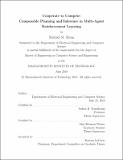| dc.contributor.advisor | Joshua B. Tenenbaum and Max Kleiman-Weiner. | en_US |
| dc.contributor.author | Shum, Michael M | en_US |
| dc.contributor.other | Massachusetts Institute of Technology. Department of Electrical Engineering and Computer Science. | en_US |
| dc.date.accessioned | 2018-12-18T19:46:51Z | |
| dc.date.available | 2018-12-18T19:46:51Z | |
| dc.date.copyright | 2018 | en_US |
| dc.date.issued | 2018 | en_US |
| dc.identifier.uri | http://hdl.handle.net/1721.1/119712 | |
| dc.description | Thesis: M. Eng. in Computer Science and Engineering, Massachusetts Institute of Technology, Department of Electrical Engineering and Computer Science, 2018. | en_US |
| dc.description | This electronic version was submitted by the student author. The certified thesis is available in the Institute Archives and Special Collections. | en_US |
| dc.description | Cataloged from student-submitted PDF version of thesis. | en_US |
| dc.description | Includes bibliographical references (pages 51-54 ). | en_US |
| dc.description.abstract | Cooperation within a competitive social situation is a essential part of human social life. This requires knowledge of teams and goals as well as an ability to infer the intentions of both teammates and opponents from sparse and noisy observations of their behavior. We describe a formal generative model that composes individual planning programs into rich and variable teams. This model constructs optimal coordinated team plans and uses these plans as part of a Bayesian inference of collaborators and adversaries of varying intelligence. We study these models in two environments: a complex continuous Atari game Warlords and a grid-world stochastic game, and compare our model with human behavior. | en_US |
| dc.description.statementofresponsibility | by Michael M. Shum. | en_US |
| dc.format.extent | 54 pages | en_US |
| dc.language.iso | eng | en_US |
| dc.publisher | Massachusetts Institute of Technology | en_US |
| dc.rights | MIT theses are protected by copyright. They may be viewed, downloaded, or printed from this source but further reproduction or distribution in any format is prohibited without written permission. | en_US |
| dc.rights.uri | http://dspace.mit.edu/handle/1721.1/7582 | en_US |
| dc.subject | Electrical Engineering and Computer Science. | en_US |
| dc.title | Cooperate to compete : composable planning and inference in multi-agent reinforcement learning | en_US |
| dc.type | Thesis | en_US |
| dc.description.degree | M. Eng. in Computer Science and Engineering | en_US |
| dc.contributor.department | Massachusetts Institute of Technology. Department of Electrical Engineering and Computer Science | |
| dc.identifier.oclc | 1078636205 | en_US |
